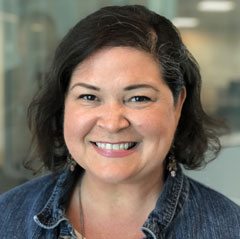Dynamic FIU program inspires future of health services

Apr 22, 2020, 9:00 AM.
article key points
FIU’s master of health services administration responds to changes and needs amid the COVID-19 pandemic.
As health care changes, so too does its instruction at Florida International University. When the Centers for Disease Control and Prevention issued recommendations for health services amid the growing concerns for coronavirus, professors began to modify curriculum for the master of health services administration immediately, says Dr. Mariceli Comellas, interim assistant chair and clinical assistant professor.
“The master of health services administration is responsive, dynamic and instructs students on current issues in the field while it shapes policy, because health care laws and situations change all the time,” Comellas acknowledges.
Responsive to changes
To address the ongoing changes, Dr. Yamile Marerro, an FIU clinical assistant professor of health services administration advises the department, so the curriculum can keep pace.
Marerro, who holds a master’s degree in public health and a law doctorate, has been a firefighter and paramedic, and also holds a master’s degree in health services administration. She offers a unique perspective as she understands the potential severity of problems in health services administration and because she’s written legislation for both state and local governments.
“There is an ongoing need for students to keep learning as things change,” asserts Marrero who discusses how an adult nursing facility in Hollywood was closed down during a recent hurricane because it didn't have appropriate administrative plans, including evacuation plans. Similarly, as facilities grapple with the new laws and systems to combat coronavirus, administrative procedures are a matter of life and death, she says, especially for our elderly population.
Appropriate, unfailing measures to ensure the health of patients, states Comellas, are a great priority in health services facilities. Several adjuncts, she points out, are CEOs for organizations in the area. They bring a level of expertise to courses that helps educate students on what’s working best.
Clinical focus
Comellas underscores that the degree, offered under the Nicole Wertheim College of Nursing & Health Sciences umbrella, is unique. It’s one of the few programs in the U.S. with a clinical emphasis. She explains that the program focuses on health at the organizational level, unlike public health, which deals with the health of a population as a whole.
“This degree centers on an organization’s ability to care for patients through leadership and management—it is a health-oriented degree that adds that business component and aims to teach students how to improve patient care and access,” she says.
Alumni perspective
“When you’re dealing with medical sales, you get into conversations with physicians regarding practices, treatments and the benefits for patients. Because of this, I became interested in consulting,” says Mark Higgins, who graduated in 2019.
In medical sales for almost a decade, Higgins made the career change because he saw the need. As a Becton Dickinson product consultant, he focuses on urology and critical care in the hospital setting to help reduce catheter-associated urinary tract infections and helps institutions avoid funding loopholes.
Higgins pursued the master’s degree in the hybrid format—classes are both online and in person, switching each week between campus and online. In total, the 48-credit-hour degree takes 24 months to complete. The program is also available in an online-only format and offers a residency option. For now, amid the coronavirus, the program and residencies are online and remote.
Residency opportunity
The residency program makes the degree unique as it places students in a range of facilities across the state and country. Like Higgins, Shahid Ullah used the hybrid format to free the extra time needed for a residency and volunteering.
“During my degree, had I been going to regular face-to-face classes, I would not have had time to give back to the community. I volunteered with a hospice care company,” explains Ullah, who has a fondness for working with the elderly—it reminds him of when he took care of his grandmothers in Pakistan.
Ullah moved to Miami, graduated in 2018, gained employment at John Knox Village of Florida, a continuing care retirement community, where he did his residency, and was recently promoted to senior accountant of budgeting. Careers in health services administration are broad, says Ullah, who notes that graduates will find they qualify for a range of positions from billing to hands-on care.
Innovative and inspiring
“Students are assessing community needs and proposing new ways to improve health services,” says Comellas, who starts off her research course with a few basic questions like, “What do you want to change in health care?”
“That's how our students get inspired,” she suggests. “In the program, graduates become agents for change in health care, and that is inspiring for many of us—especially now with COVID-19.”
